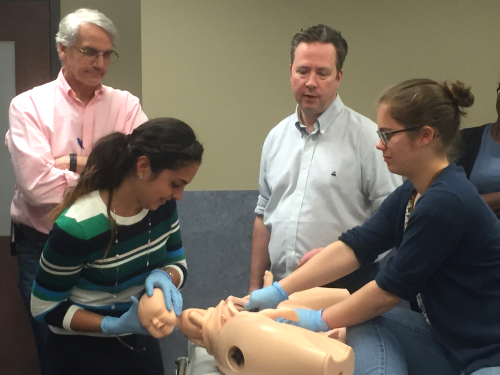The Royal College of Physicians and Surgeons of Canada provides support for a distinguished educator to visit a Royal-College accredited simulation centre in Canada each year via the John. G. Wade Visiting Professorship in Patient Safety and Simulation-Based Medical Education.
This spring, the Steinberg Centre for Simulation and Interactive Learning (SCSIL) was privileged to welcome visiting professor Dr. Tim Draycott, a consultant obstetrician from the Southmead Hospital in the United Kingdom and Health Foundation Improvement Science Fellow. As a committed member of a multidisciplinary team that cares for women in labour, he developed a program to explore how we can make all births as safe as they could, and should, be.
“Dr. Draycott shared his knowledge with passion and enthusiasm during Obstetrics and Gynecology Grand Rounds held at the McGill University Health Centre (MUHC) on May 4, 2017. His presentation on the subject of Effective Training for Obstetric Emergencies was entertaining and well-received by faculty and staff in attendance,” remarked Dr. Togas Tulandi, Professor and Chair of Obstetrics and Gynecology, and Milton Leong Chair in Reproductive Medicine, McGill University and Chief of Department of Obstetrics and Gynecology, MUHC.
Physicians, nurses and residents all benefitted from two wonderful, fun-filled days of learning with Dr. Draycott during simulation workshops held at the SCSIL. During the first workshop, Simulation in Maternity Care, participants had the opportunity to review the risk factors, causes and treatment of a major postpartum obstetric haemorrhage through scenario practice. The second interactive workshop focused on PRactical Obstetric Multi-Professional Training (PROMPT), an evidence-based, multi-professional training method that prepares unit level staff to improve their management of obstetrical emergencies. This training is associated with direct improvements in perinatal outcome and has been proven to improve knowledge, clinical skills and teamwork. Obstetrical staff from the Jewish General Hospital’s Family Birthing Centre were among those in attendance, and they were impressed with the reduction in obstetrical complications that resulted from Dr. Draycott’s training methods.
"Mandatory, annual simulation training of all obstetrical staff in my institution virtually eliminated the long-term neonatal consequences and sequela of shoulder dystocia," summed up Dr. Draycott during his workshop. Shoulder dystocia is one of the most difficult and unpredictable obstetrical complications; it occurs during cephalic [head first] vaginal deliveries when the fetal shoulders do not deliver after the head has emerged because one or both shoulders becomes impacted against the bones of the maternal pelvis. This reduction in complications is a remarkable achievement, and one that has been subsequently repeated in a US obstetrical centre using Dr Draycott's methods.
It is a privilege to meet and learn from experienced simulation leaders like Dr. Draycott, reminding us that no matter how skilled we are, there are always opportunities for further growth.
To learn more about PROMPT training, visit http://www.promptmaternity.org/
For more on the John. G. Wade Visiting Professorship, visit www.royalcollege.ca/awards



